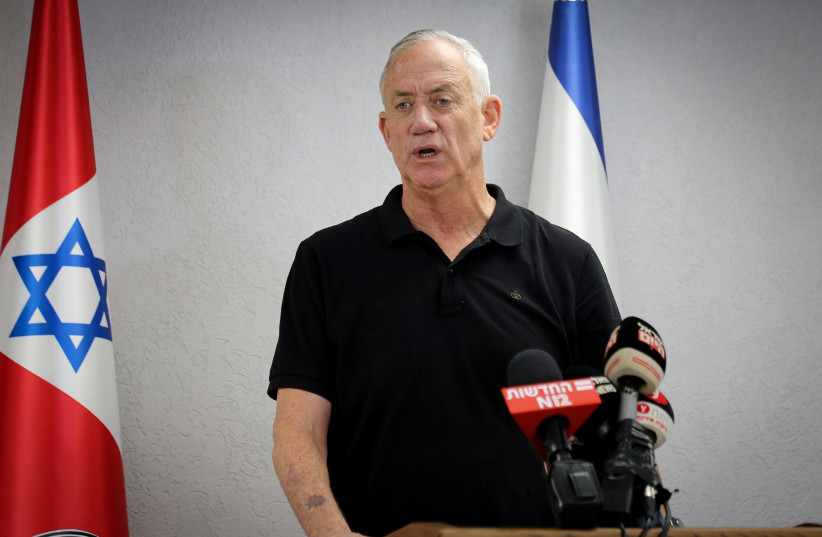Security forces demolished three modular homes and a synagogue in the illegally built Ramat Migron outpost but held off from taking any action to raze the Homesh yeshiva.
The Border Police and Civil Administration teams surprised the three settler families overnight when they surrounded their homes in the Binyamin Region of the West Bank and proceeded to demolish their homes on Thursday morning.
Settlers took a video that appeared to show officers attempting to enter one of the homes, while a woman was undressed.
"Give us a minute to put clothes on," a man can be heard saying.
The outpost was first erected on the Migron hilltop in 2017, near the site of the original Migron outpost which was forcibly evacuated in 2012 after the High Court of Justice ruled it was illegally built on private Palestinian property.
A new authorized community was constructed for the Migron families on a stretch of state land on another part of the hilltop, but settlers want to expand Israel's holdings in that area with a new outpost.
Ramat Migron demolished, rebuilt ten times
According to the NGO Peace Now, Ramat Migron has been demolished some ten times since its inception.
Security forces took action against Ramat Migron hours after the state affirmed to the High Court of Justice late Wednesday it was determined to demolish the illegal West Bank Homesh yeshiva but gave no evacuation date.\

"The place must be evacuated," the state told the court on Wednesday in the name of the IDF and Defense Minister Benny Gantz, as it explained that it was strictly preventing any new construction at the site.
It spoke in response to a 2019 petition by the NGO Yesh Din against the small modular seminary that has been located on an isolated hilltop in the Samaria region of the West Bank for over 15 years.
It is all that remains of the settlement and yeshiva that had been located on that hilltop, but which the government destroyed in 2005.
Settlers and right-wing activists want to see the community and yeshiva rebuilt and authorized. They have redoubled their efforts in the aftermath of a terror attack in Homesh in December 2021, that claimed the life of yeshiva student Yehuda Dimentman, 25.
The bulk of the hilltop, however, belongs to the Palestinians from the nearby Burka village. The High Court of Justice recognized the right of the Palestinians to farm their land on that hilltop in 2013.
In June the court upheld that right and accepted an earlier declaration of the state, which mirrored this one, that it intended to remove the yeshiva from the hilltop.
It had asked the state for an update on the situation by August 10.
Yesh Din said in response that "the State of Israel continues to procrastinate and continues to refuse to perform its legal and moral duty which is evacuating the outpost that was established illegally on private land belonging to residents from the village of Burka.
"The dispossession of Palestinians and the theft of their land must end - every passing day further increases the injustice and rewards the offenders.
"Like their predecessors, Israel’s defense and prime ministers prove that the rule of law always retreats in favor of political interests and in favor of the settlers’ satisfaction," Yesh Din stated.
In advance of the state's submission, Dimentman's window Ethia had appealed to Justice Minister Gideon Sa'ar who heads the New Hope party to authorize the yeshiva in her husband's name and if not, to at least delay any action until after the election.
Her husband studied on the Homesh hilltop as an emissary for the Jewish people, "he didn't go there for himself" but for his "brothers in Tel Aviv, Jerusalem and Haifa."
She noted a Jewish presence on the Homesh hilltop would help preserve Israel's hold on the strategically important region of northern Samaria.
The former Homesh community was one of four northern Samaria settlements Israel evacuated during the 2005 Disengagement in which 21 Gaza settlements were evacuated.
Those on the Right view its demolition as a second Disengagement. Ethia noted that the date of the state's submissions fell on the 17th anniversary of the 2005 Disengagement.
The presence of the Homesh yeshiva on the hilltop shows that the "people of Israel have returned to their land," she added, hoping that the Homesh settlement would soon be rebuilt along with all the other destroyed settlements.
"We hope the government won't reward terror, not in Homesh and not anywhere else," she said.
